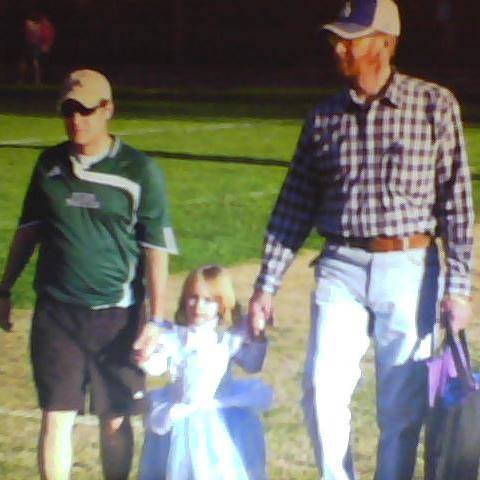RLL 45: Beginnings and Endings
Happy Sunday, everyone, and I hope you’ve had an amazing week! Mine was quite busy (as usual), and I’m excited to share with you some of the experiences I had and also some of the lessons I learned.
My younger daughter and I, back when she was still too young to play in our local league.
Each fall for most of the last decade, one or both of my daughters has played soccer in our local church’s youth league, and I have been their coach. Yesterday, my older daughter got her first experience as a referee in the same league, and my younger daughter is now in her last season of eligibility before she ages out of the program. This is a time transition for them and for me, as they continue to get older.
Thankfully, yesterday I had an opportunity to be reminded of why I have spent so much time coaching youth soccer (and especially my daughters’ teams). Each season I tell the parents that I have three goals for our team, and none of them involve winning soccer games. You may ask why we play, if not to win; well, please don’t misunderstand me: I LOVE to win. At anything and everything. But when it comes to youth sports, winning is not the main thing. For me, youth sports involve the three goals I referenced above: 1) I want the kids to HAVE FUN, because if they do, they’ll continue playing and they’ll enjoy themselves at each practice and game; 2) I want the kids to LEARN something about the game, because then I know I’ve done my job at each practice and game; and 3) I want the kids to WORK hard, because then their parents are happy!
None of those three goals involves winning a soccer game, but if we do those things each and every time we play, then our season will be a success. These kids are 9-11 years old, so no one is winning scholarships or awards or anything like that; so winning games shouldn’t be our main focus. What we are there to do is to teach character through competition. We still keep score, and there is a tournament at the end of the season whose winner gets a trophy. So the competition is very real; but it’s also a great reminder that winning is not the ultimate end.
My younger daughter and I yesterday, on her last “First Day” of the season. Time flies!
For anyone who is competitive, though, the temptation to “win at all costs” is always there: in youth soccer, in life, in business, and everywhere else. What I’ve found is that coaching youth soccer is as much about character development for myself (and the other coaches and parents) as it is for the children. How often have we witnessed parents yelling horrible things at each other or at officials, over a game being played by kids in elementary school? I know myself well enough to know that I have the potential to be that parent, if my emotions aren’t kept in check. That’s not fun to admit, but I do know it’s true. So for me, coaching the kids is about helping them, and it’s about helping myself grow.
What’s the point? Just this: we all need to continue to foster growth in ourselves, and one of the best ways to do that is to help others grow. It’s hard to expect children to do well if we are setting a poor example. And when we do mess up, it’s important that we set a good example in how to apologize, ask forgiveness, and try to make things right (and I had an opportunity to do those things yesterday, too; not something I’m proud of).
This week, ask yourself two questions: 1) how am I continuing to develop my own character? and 2) how can I help others grow as well?
As always, I’d love to know what you come up with! Also as always, please feel free to share this with anyone you think needs it! Come by the website and sign up to receive your free copy of my ebook called ‘(Extra)Ordinary Leadership: 10 Things Dad Taught Me Without Saying Anything’. Have a great week, and keep leading!




